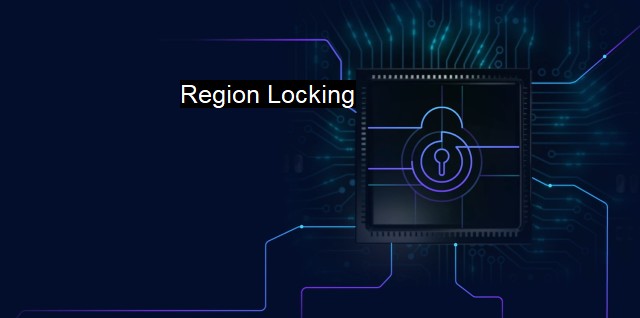What is Region Locking?
Region Locking: A Critical Approach for Restricting Technology beyond Borders and Enhancing Cybersecurity
Region locking, often referred to as geo-blocking, is a kind of digital obstruction method used in technological devices—such as a gaming console—and software like antivirus where certain content is accessible only in particular geographical locales. Region locking bases its algorithm on the geographic location corresponding to a user's Internet Protocol (IP) address. This approach arises from diverse triggers, including censorship laws, copyright contracts, or strategic business preferences, and is increasingly enacted within the cybersecurity industry.Antivirus programs often incorporate region locking for an array of rationales, highlighting the broad-spectrum usage of this buttressing concept in various aspects of cybersecurity. Before delving into antivirus software, it is imperative to understand region locking from a technologist's perspective. Under certain conditions, explicit content or specific services must remain exclusive to predetermined regions or markets. Though this might surface either through a balanced corporate stance or pursuant to licensors' demands, the ultimate goal is to cement control over content dissemination over the web.
Typically, digital providers, such as streaming services or software companies, employ region locking to ensure that specific products or services are only available within certain geographic areas. For instance, it helps organizations in tailoring their offerings to different markets, taking into account specific regulations, cultures, or other local conditions. From a cybersecurity viewpoint, keeping particular resources restricted within outlined geographical zones can enhance their security control, reducing the risk of unwanted access.
Turning the spotlight on antivirus software, the practice of region locking plays an essential role. It provides an additional layer of protection against potential threats infiltrating a computer system. Region locking can rupture the path of an international cyber-attack because the malware has to be tailored to bypass this geographically-based defense system.
Region locking assists antivirus software to adapt better functionality by adjusting its utility to specific regions. Antivirus programs can focus on particular prevalent issues in the corresponding regions, offering more customized services. In this way, region locking bolsters our defense against potential cyber threats while providing the latitude required for a bespoke type of cybersecurity.
Amidst this debate, region locking warrants an ethical dialogue as well. Critics argue that it inclines towards digital discriminations, posing an impediment to the free flow of information. Yet, supporters uphold in mitigating this infringement, emphasizing that region locks are like immigration regulations of the cyberworld, providing an essential boundary.
Region locking has even attracted legislative debates. In the European Union (EU), as an example, legislators deemed geo-blocking as a discriminatory practice within the union arguing free service trade. Consequently, they enforced laws inhibiting organizations from practicing geo-blocking within the EU, leading to overarching questions about the ethical justification and potential fallout of these schemes.
Region locking holds pragmatic merit for industry stakeholders, and grappling its complexities provides instrumental insights into modern-day cybersecurity challenges and stratagems. Navigating these tensions necessitates a balanced perspective, harmonizing the integrity of digital borders with the cardinal mandate for freedom of information. As cybersecurity tactics continue to transform in the digital age, region locking serves as an eminent illustration of how conventional geographic principles migrate to the ever-evolving cyber regime.
It is important to note that region locking is not an impregnable cybersecurity measure. Nor should it stand alone in a cybersecurity strategy. More layers need to be added according to the organization's objectives and concerns. But with region locking strategized as the geographical layer in a system of defenses, the chances of an attacker dealing a devastating blow can be substantially minimized.
In the technological era of increased global interconnectivity, region locks remain an underlying, yet formidable aspect of cybersecurity, linking geographic limitations and digitized frontiers in an ever-expanding digital universe. Combative in its core and formative in its challenge against cyber threats, region locking's role in antivirus software is significant, perpetuating an arduous corporate challenge while empowering its defense against formidable cyber adversaries.

Region Locking FAQs
What is region locking in the context of cybersecurity and antivirus?
Region locking is a feature used by many software companies, including antivirus providers, that prevents users from accessing their software from certain regions. This is done in order to comply with local laws and regulations, and to prevent unauthorized use of the software.Why do antivirus providers use region locking?
Antivirus providers use region locking to comply with local regulations and to prevent unauthorized use of their software. It is also used to prevent piracy and to protect their intellectual property.Can I bypass region locking to access an antivirus program from a different region?
It is not recommended to bypass region locking as it may violate the terms and conditions of the software license agreement. Additionally, some antivirus providers may block access or limit functionality if their software is used in an unauthorized manner.Does region locking affect the effectiveness of an antivirus program?
No, region locking does not affect the effectiveness of an antivirus program. The software will still function as intended, but it may be limited in terms of certain features or updates that are only available in certain regions.| | A | | | B | | | C | | | D | | | E | | | F | | | G | | | H | | | I | | | J | | | K | | | L | | | M | |
| | N | | | O | | | P | | | Q | | | R | | | S | | | T | | | U | | | V | | | W | | | X | | | Y | | | Z | |
| | 1 | | | 2 | | | 3 | | | 4 | | | 7 | | | 8 | | |||||||